Daily Coping Skills, Part 2
References
1,001 Ways to Relax: An Illustrated
Guide to Reducing Stress
Mike George
Chronicle Books, San Francisco, 2003
Body Movement for Inner
Harmony
Tucker, Evans, Hudson, and MacDonnell
Lorenz Books, New York, 2002
Feeling Good: The New Mood Therapy
David D. Burns, M.D.
Harper Collins Publishers,
Inc., New York, 2000
Mind Games
Michael Powell
Gusto Company, New York, 2004
Pumping Ions: Games and Exercises
to Flex Your Mind
Tom Wujec
Doubleday,
New York, 1998
SAMHSA's National Mental Health Information Center
Online Mental Health Publications
www.mentalhealth.org
Simply
Relax: An Illustrated Guide to Slowing Down and Enjoying Life
Sarah Brewer, M.D.
Ulysses Press, Berkeley CA, 2000
"The
Science of Happiness" (cover)
TIME, Special Mind
& Body Issue
January 17, 2005
Medication Management Tips
Maintain an open
dialogue with your psychiatrist
Familiarize yourself with the
medications prescribed. Take the pills as directed.
Discuss beforehand what to do in the event of certain side effects.
Don't change your dose or discontinue the medication without first
discussing this with your physician; stopping meds abruptly can lead
to dangerous results.
Work the medications into your schedule
The
fewer the number of pill-swallowing sessions, the more likely people
are to stick to medication regimens. So, if you're taking
pills 4 times a day, talk to your doctor to see if there's a
way to adjust the timing so that you can condense them into
2 or 3 sessions.
Pay attention when taking pills
Make
sure there is sufficient light in the room to double-check the
name of the medication on the bottle. Also verify that you have
taken out the correct number of pills.
Establish a routine
Especially
if working with a handful of medications simultaneously, consider
mapping out a medication schedule for yourself--possibly even color
coding the medications to better visualize the routine. If the
medication allows for it, try taking the medication at meals or as
part of your bed time routine, so that you know each time you sit
down to eat breakfast, for example, you also swallow your pills.
Get
organized
Keep the pill cases all in one place. Set aside
the day's pills beforehand. Consider purchasing a daily or weekly pill
case with divided sections. Know ahead of time (perhaps even create
a "medication calendar") when you will run out of pills,
so that you can either refill the bottle or obtain a new
prescription.
If you're uncomfortable taking pills in public...
If
you're afraid people will find out which medications you're taking,
carefully place the correct pills in either a discrete bottle or a
deceptive bottle (for example, an otherwise empty bottle of aspirin).
Excuse yourself from their company, take the pills, then return.
When
suicidal thoughts are present...
Have someone living with you
hide the medications somewhere, maybe even in a home safe if
you have one; they can distribute the meds to you on a daily basis
and also watch you take them (to prevent you from hoarding pills for
"later"). If you live on your own, consider asking a friend,
neighbor, and/or co-worker to assume this role temporarily.
If that's not possible, try placing the meds in a hard-to-get-to location,
so that it slows you down if you want to give in to impulsivity.
Also, speak to your psychiatrist about increasing the number of refills
(while also lowering the number of pills in each refill) so that you
have access to fewer pills at any given time. (For example,
instead of having one refill of 30 pills, you might have 3 refills
of 10 pills each.) If you find yourself pill hoarding,
let someone you trust know so that they can help you monitor
the pill situation.
Fighting the Urge to Throw the Covers
Over Your Head and Do Absolutely Nothing
There are many reasons why
people like to snuggle under the covers during depression.
Examples
of common self-defeating statements include:
"I'm not gonna feel
better anyway, so what's the point?"
"There's too much to accomplish;
I'll never finish!"
"I'm just lazy and a good-for-nothing. This
proves it."
"What if I try and fail?"
"I don't have to do this just
because you say so!"
If you find yourself stuck in this
pattern, there are some techniques to try if you're having trouble
getting started with your day.
Do at least one thing you enjoy
each day
You might not feel like doing the things you
once enjoyed, but what you might find is that, even if motivation
and interest are not present initially, they can actually develop
as a result of the activity itself. Giving yourself the permission
to do something you enjoy each day will help give you something to
look forward to.
Break larger tasks into smaller chunks
Separating
the whole task into parts will make the "impossible" seem less overwhelming.
It allows you built in breaks to spread out the chunks over the course
of time. It also fosters a sense of accomplishment
at each stage, rather than having to first wait until the entire task
is completed.
Create a daily schedule for yourself
Structure
is a helpful element in accomplishing tasks. Placing activities
in time slots prior to the day eliminates the need to decide if and
when to do something. Also, tackling even one small task can
lead to a sense of accomplishment.
You might wish to start
of simple. At the end of your day, analyze which parts
of the schedule were most successful and why.
The following
is an excerpt from a daily schedule:
9am
Wake up
9-10am Morning routine (shower, breakfast,
etc.)
10-11am Light exercise
11-12pm Pay bills
12-1pm
Lunch
Conduct an experiment
If you're having trouble getting
started because you are anticipating an activity will be
too difficult or unrewarding, try this little experiment: Select an
activity (for example, grocery shopping) and break it down into its
components (i.e. creating the shopping list, driving to the store,
putting food in the cart, checking out, driving home, and putting
the packages away). For each of the components, predict how
difficult and satisfying you think they will be (percentage from 0-100%).
Then, after you complete each sub-task, write down both
how difficult and satisfying it actually was (also a percentage).
For example, it might look something like this:
Component P. Diff. A. Diff. P. Satisf. A. Satisf.
shopping
list 90%
10% 10%
60%
Compare the predicted (P) to the actual (A) values.
Was it as difficult and unrewarding as you guessed? Chances
are it wasn't.
5
Quick Tips to Change the
Way You Think
1) Eliminate "should"
from your
vocabulary. Since the expression
doesn't take into account disability
and is often
unrealistic to begin
with, it only increases stress.
Instead, focus on what you are
capable of doing
at the moment.
2) Think of reasons why you "can"
instead of "can't" do things. This
positive
thinking, as opposed to
beating yourself up, can
act as a
motivator.
3) Avoid catastrophizing--seeing
small problems as major issues.
Relax.
The world won't end if you
forgot to pick up
milk at the
grocery store!
4) While
it's good to consider and
plan for the "what ifs"
in life,
dwelling on worst case scenarios
will get you nowhere.
5) Gray is part of the color
spectrum,
too; things don't have to be either
black or white. Most issues have a
vast middle
ground.
Maladaptive Coping Mechanisms: When Bad Habits
Form
Sometimes, when the depression becomes overwhelming, people
look for temporary escapes in order to cope. This may include
anything from drinking and drugs to overeating to self injurious behaviors
such as cutting or burning one's skin and banging one's
head. (Self injury is not an attempt at suicide.)
The subconscious
goal of these behaviors may be to become "numb" to the pain or, on
the contrary, to feel "alive" again, depending upon the individual.
So what can you do if this applies to you? First of all,
try to reduce any feelings of shame; even though these aren't the
best outlets by far, the intent was to help yourself cope. Get
professional help--especially if the habit interferes with treatment
(for example, drinking and meds don't mix well). Talk to other
people trying to recover from these addictive behaviors; support groups
can be wonderful resources for information sharing. Also, strive
to replace the maladaptive coping mechanism with a healthier substitute.
Improving How You View Yourself
Depression, which can lead
to loss of productivity, is often associated with a loss of self worth.
Poor self-esteem then feeds into it by discouraging the individual
to take healthy risks and simply be him or herself. The
journey towards enhanced self-esteem will not take place overnight;
however, the rewards of a renewed sense of worth can be signficiant, including increased general
happiness and satisfaction with life. The following are some
basic strategies in tackling low self-esteem:
1) Create
positive affirmations for yourself by replacing
negative self-talk with more supportive thoughts.
(Examples of affirmations include, "I am a wonderful
person" and "I deserve to be happy and healthy.") Even
make your own affirmation tape to play during
car rides.
2) Don't limit your self worth to career success.
Aside
from the fact that you have the power
to determine what
"success" means to you,
happiness and confidence
are just as likely,
if not more so, to arise from
relationships
with friends and family.
3) Do things on a daily basis
that can help boost
confidence. For
example, listen to your body's needs,
do personal
hygeine tasks, dress comfortably in
clothes
that make you feel good about your
appearance, treat
yourself to a nice meal
by candlelight and
with background music, etc.
4) Set aside more
time to do the things you're good at.
Chances are you enjoy these activities, anyway. Even
if you're not the best at a particular skill, don't let that
stop you, if it's something that brings you joy.
5)
If you have been procrastinating about completing
one task in particular, take a deep breath and just get
through it. Chances are, it won't be as bad as you've
been building it up to be, and the sense of
accomplishment upon its completion will be welcomed
relief.
6) Do nice things for people--yourself included!
For others,
consider everything from volunteering through
an
organization to smiling at the person next
to you in
line. For yourself, you
may wish to buy yourself
something nice
(a new CD, flowers, etc.) or allow
yourself
to take that course you were always interested
in. As a spin off of a quote: Kindness is contagious.
Infect others.
Self-Esteem Boosting Exercises
Lists: Work
against the pull toward negative thoughts by creating lists addressing
topics like:
- 5 things you admire about yourself
- 5 achievements in
your life
- 10 ways in which you can treat
yourself
to something for free
Message on a Chalk Board: Go back to your
school days in this visualization by imagining a black board
with animated chalk copying down a list of your personal affirmations.
"Be
Good to Yourself" Calendar: On each day of the calendar, write down
the one thing you can do that day to "be good to yourself," (for example,
play with the family pet, grab an ice cream cone, etc.)...then do
it when that day arrives!
Honorary Personal Scrapbook: Tap into
your creativity in this scrapbook
celebrating YOU. You
might include things like pictures, your writings, momentos from your
past, cards you've received, your favorite things, your stance on
issues, etc. Flip through it when you could use a self-esteem
boost.
Simple Ways to Make a Difference
At
times, because of low self-esteem, we may question our impact on society,
viewing ourselves as burdens on the people around us. One great
way to help yourself work through these doubts is to pitch in--in
whatever way(s) you are able to at the given time. Depression
can make it really difficult to undertake any major projects, but
there are many ways to contribute on a more basic level.
Consider some of the following:
- click a button to raise money
at
- give someone a gift for "no reason"
-
donate blood
- pleasantly surprise a senior citizen
by paying
for his or her groceries
- let the mother in a rush to get
somewhere
go in front of you in line
- bake cookies for a family new to
the
neighborhood
- separate out papers and plastics for
recycling
-
bring canned goods to a homeless
shelter
- drop off old pairs
of eyeglasses at
LensCrafters stores (They go to
people
in developing countries.)
- raise money from friends and family
you see on a regular basis and
attend a walk-a-thon event
- put
quarters in expired parking
meters
- e-mail someone you haven't
heard
from in a while to get back in touch
- donate old
books to a local library
- create a "care package" for someone
who's sick (include things such as
soup, tissues, magazines,
breathing
strips, comfy socks, teddy bear,
"get well" card, etc.)
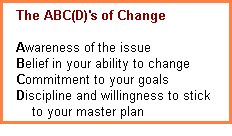
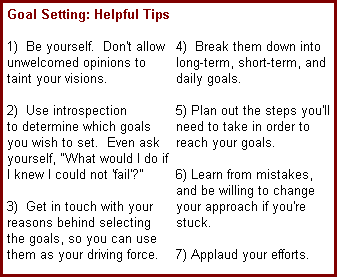
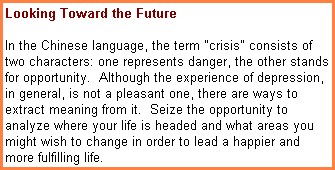
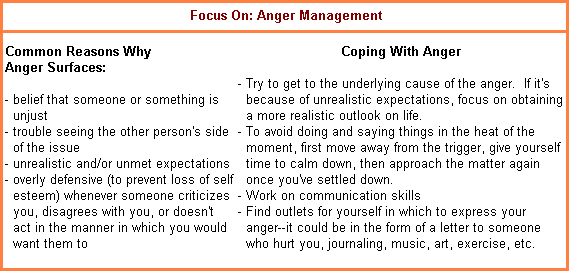
Part 2 touches upon such topics as medication
management, procrastination, motivation,
self-esteem, future goals,
anger management, and happiness.
Navigating
through the storm...











